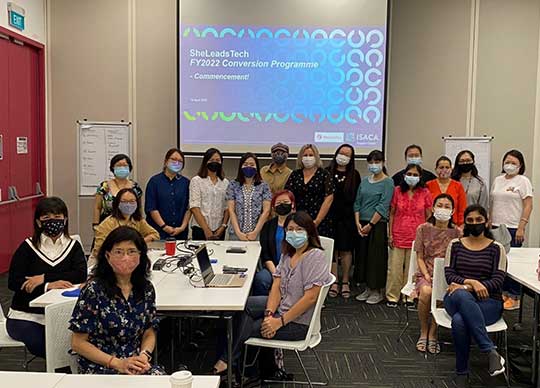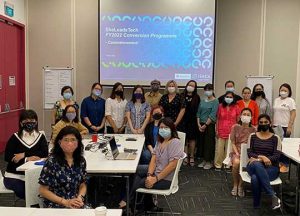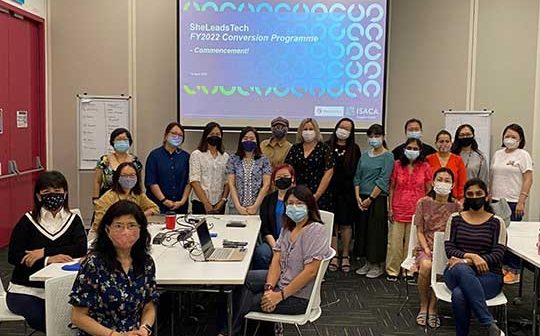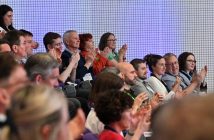

ISACA Singapore Chapter’s SheLeadsTech (SLT) Conversion Programme – Inaugural 2022 class with mentors, and Jenny Tan.
ISACA Singapore Chapter’s SheLeadsTech (SLT) was launched on 8 March 2019 by Jenny Tan (VP, ISACA Singapore Chapter) and since then there has been key events in Singapore, such as the SLT Conferences in 2020 and 2021 featuring Identity Management and Digital Resilience, the SLT mentorship programme in 2020 and 2021, and supporting partnerships with SLT conferences across the world.
The most recent one is the SLT Conversion Programme, which offers the opportunity for non-IT female professionals to pick up technology GRC competency and switch career.
Targeted to elevate the presence of women in the technology workforce, ISACA Singapore Chapter SLT has partnered TTAB to help women explore how they can enter the technology industry.
With a structured curriculum to provide a foundation in technology, it is hoped that these female professionals can over time advance into the cybersecurity space.
The inaugural programme kicked off on 16th April 2022, and we speak to Jenny Tan to learn more about the programme.
What is the inspiration behind the ISACA Singapore Chapter SLT Conversion Programme?
The programme supports the overarching ISACA SLT mission, which is to engage and elevate women into the technology workforce.
From a local perspective, the programme aims to play a part in closing the technology talent gap in Singapore, and to support the nation’s “Digital for Life” movement in galvanising the community to embrace digital technology and enrich lives.
From a personal perspective, I also want to help those who genuinely want to switch career but could not find the right-fit programme to do so. This could be due to various reasons, such as lack of technology backgrounds, or simply that they have been disconnected from workforce for many years. Moreover, I think that many existing programmes help with job placements but lack imparting “how-to” knowledge and skills.
The idea behind ISACA Singapore Chapter’s SLT is to be an ideal bridge to link expectations end-to-end. This is achieved by deploying technology GRC expertise to equip the candidates with the necessary knowledge and skills, and partnering with corporate organisations to offer internship opportunities before placement consideration.
You have narrowed the candidates for the 2022 inaugural programme to 11 candidates, with talents ranging from women who had been homemakers, to sales professionals in the technology sector. Could you tell us more about the criteria to enter the programme?
We encourage women with a minimum 2 years of non-IT work experience (for examples, finance, administration, marketing) and a non-IT degree, or are stay-home-mums who have not worked for at least 5 years, and is a degree holder, to apply to the programme.
In addition, during the interview, we would be looking for candidates with the right attitude and passion to learn more about technology, and excited to join the technology workforce.
We see that the programme duration ranges from 12 – 18 months with 3 stages. Can you tell us more?
The initial stage (2 – 3 months) is the training stage, which consists of 60 hours of foundation theory and practical sessions conducted by practitioners.
The second stage (3 months) is an internship, where partnered companies will provide at least 1 meaningful project participation opportunity to the intern.
The final stage (6-12 months) is an attachment placement. These are mutually agreed placement arrangements, where partnered companies offer contractual placement opportunity to intern that is convertible to permeant staff contract.
What are some examples of what the candidates will learn during the initial training stage?
Besides foundation lessons on information technology, we have lessons on technology governance, audit methodology and process assessment, risk management, network security and more.
To help apply the knowledge gained in classrooms to real-life scenarios, there will also be case studies for candidates to discuss their analysis with the concepts learned.
In addition, we are also devoting several lessons on the development of soft skills, such as “growth mindset and coaching management”. For us, the key objective behind becoming a qualified tech GRC professional is acquiring not only the technical knowledge, but also the mindset change.
For the internship stage and the attachment placement stage of the programme, you have partnered the programme with multiple private sector companies. Tell us more about how you brought these companies on-board.
These companies include the “Big 5” auditing companies (Ernest & Young, Deloitte, KPMG, PriceWaterhouseCoopers, RSM Singapore), Frost & Sullivan, Keppel, CapitaLand, Crimson Logic, Assure-IT and DYNAfense Cybersecurity.
The advantage of partnering with these companies are manifold. Not only are the programme objectives aligned with their mission (such as their promotion of diversity programmes), they also require technology GRC talents to complement their teams. In fact, the 3 stages of the programme and the timeframe matched the partnered companies’ talent recruitment and development plan.
The candidates are paired one-to-one with mentors. How would the mentorships help the candidates throughout the programme?
The mentorship programme is intended to provide guidance to the mentees, who will learn from practitioners in the technology field, with experience ranging from software engineers to technology Internal Audit like myself.
The commitment is for the mentors and mentees to hold four 1-hour sessions from May to September.
The sessions provide the opportunity for the mentees to discuss learning points and explore development goals to overcome some of the challenges faced. More importantly, for those who have been out of the workforce for some time and face the challenge of taking on new roles in a dynamic work environment, the mentoring could help mitigate some of their anxiety risks.
We are of the view that “a goal without a plan is just a wish list.” Therefore, we would be looking for agreed action points as a wrap up of each mentoring session.
Finally, you remind the candidates that the programme is about learning and not finding a job. Why is this important?
We strongly believe that if our candidates are too pre-occupied with job placement, they may overlook the importance of the learning journey in acquiring knowledge and skills.
The opportunity for a job placement naturally opens up when candidates demonstrate a commitment to learning during the training and internship stages.
In addition, the curriculum is structured such that the knowledge and skills acquired are also highly applicable to other technology opportunities outside of this conversion programme.






